Jeep Compass vs Renault Scénic - Differences and prices compared
Compare performance (213 HP vs 218 HP), boot space and price (34200 £ vs 34600 £ ) at a glance. Find out which car is the better choice for you – Jeep Compass or Renault Scénic?
Costs and Efficiency:
When it comes to price and running costs, the biggest differences usually appear. This is often where you see which car fits your budget better in the long run.
Jeep Compass has a slight advantage in terms of price – it starts at 34200 £ , while the Renault Scénic costs 34600 £ . That’s a price difference of around 428 £.
In terms of energy consumption, the advantage goes to the Renault Scénic: with 16.60 kWh per 100 km, it’s hardly perceptible more efficient than the Jeep Compass with 17.50 kWh. That’s a difference of about 0.90 kWh.
As for electric range, the Renault Scénic performs a bit better – achieving up to 598 km, about 98 km more than the Jeep Compass.
Engine and Performance:
Under the bonnet, it becomes clear which model is tuned for sportiness and which one takes the lead when you hit the accelerator.
When it comes to engine power, the Renault Scénic has a barely noticeable edge – offering 218 HP compared to 213 HP. That’s roughly 5 HP more horsepower.
In acceleration from 0 to 100 km/h, the Renault Scénic is slight quicker – completing the sprint in 7.90 s, while the Jeep Compass takes 8.50 s. That’s about 0.60 s faster.
In terms of top speed, the Jeep Compass performs barely noticeable better – reaching 188 km/h, while the Renault Scénic tops out at 170 km/h. The difference is around 18 km/h.
There’s also a difference in torque: Jeep Compass pulls somewhat stronger with 345 Nm compared to 300 Nm. That’s about 45 Nm difference.
Space and Everyday Use:
Whether family car or daily driver – which one offers more room, flexibility and comfort?
Both vehicles offer seating for 5 people.
In curb weight, Jeep Compass is slight lighter – 1667 kg compared to 1822 kg. The difference is around 155 kg.
In terms of boot space, the Jeep Compass offers slight more room – 550 L compared to 545 L. That’s a difference of about 5 L.
In maximum load capacity, the Renault Scénic performs barely noticeable better – up to 1670 L, which is about 109 L more than the Jeep Compass.
Who wins the race in the data check?
The Renault Scénic has only a minor advantage in the objective data comparison.
This result only shows which model scores more points on paper – not which of the two cars feels right for you.
Costs and Consumption
View detailed analysis
Engine and Performance
View detailed analysis
Dimensions and Body
View detailed analysis
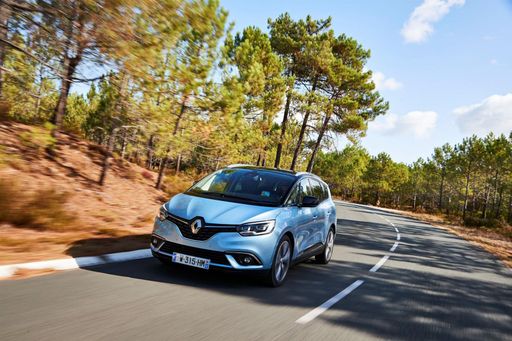
Renault Scénic
Jeep Compass
The Jeep Compass packs classic Jeep styling with a surprisingly composed demeanor, equally at home turning heads in the city or tackling a weekend dirt track. Inside it's a pragmatic, user-friendly compact SUV that prioritizes comfort and versatility — a smart pick if you want a dose of adventure without giving up everyday sense.
details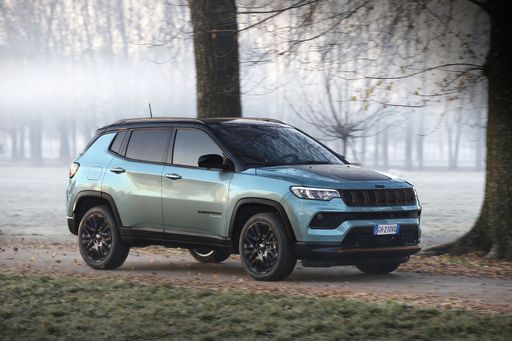
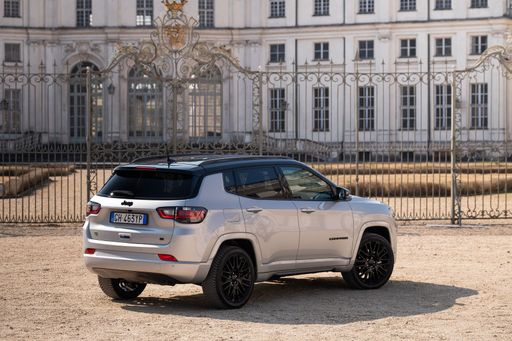
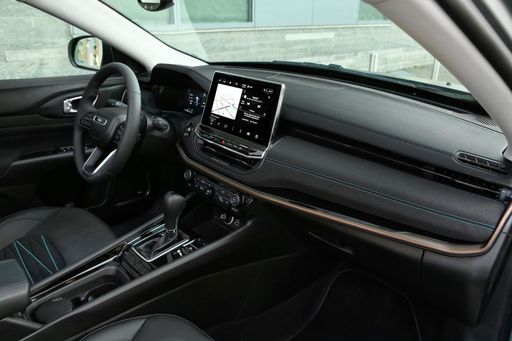
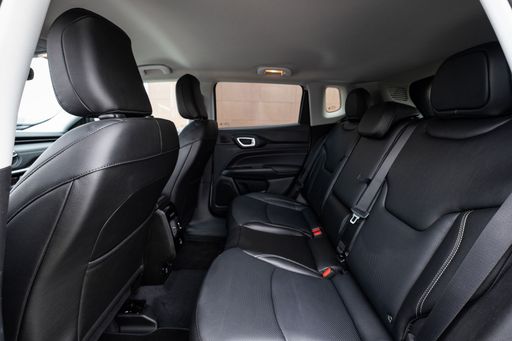
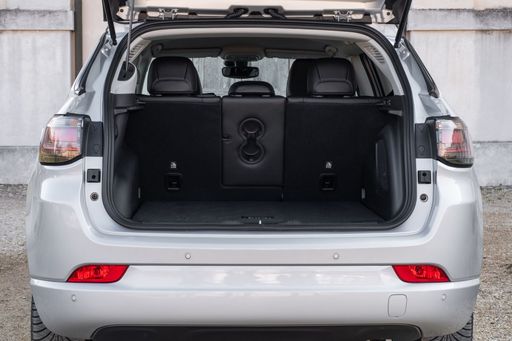
Renault Scénic
The Renault Scénic is a quietly clever family MPV that balances everyday practicality with unexpected flair, offering a roomy, flexible cabin that makes school runs and weekend escapes less of a chore. It won't dazzle like a sports car, but its composed ride, sensible tech and thoughtful storage solutions make it a superbly pragmatic choice for buyers who prefer substance with a wink.
details
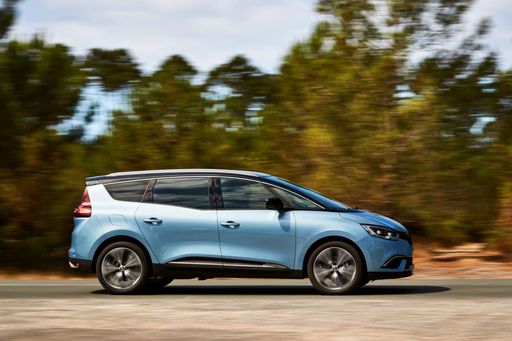
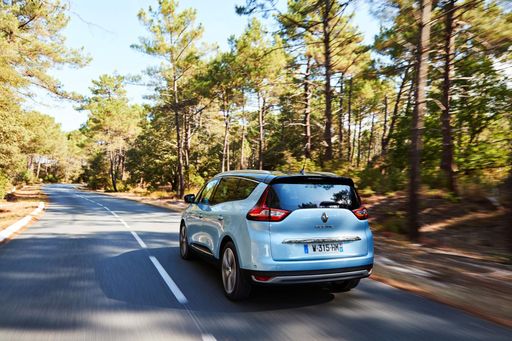
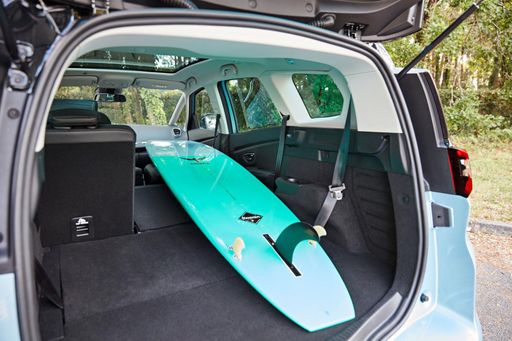
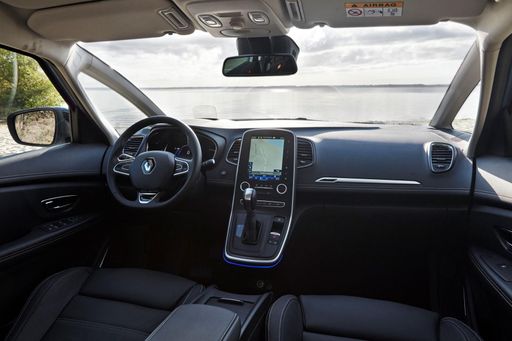
Costs and Consumption |
|
|---|---|
|
Price
34200 - 43200 £
|
Price
34600 - 44000 £
|
|
Consumption L/100km
5.80 L
|
Consumption L/100km
-
|
|
Consumption kWh/100km
17.50 kWh
|
Consumption kWh/100km
16.6 - 17.5 kWh
|
|
Electric Range
500 km
|
Electric Range
420 - 598 km
|
|
Battery Capacity
74 kWh
|
Battery Capacity
-
|
|
co2
0 - 130 g/km
|
co2
0 g/km
|
|
Fuel tank capacity
55 L
|
Fuel tank capacity
-
|
Dimensions and Body |
|
|---|---|
|
Body Type
SUV
|
Body Type
SUV
|
|
Seats
5
|
Seats
5
|
|
Doors
5
|
Doors
5
|
|
Curb weight
1667 - 2198 kg
|
Curb weight
1822 - 1927 kg
|
|
Trunk capacity
550 L
|
Trunk capacity
545 L
|
|
Length
4552 mm
|
Length
4470 mm
|
|
Width
1928 mm
|
Width
1864 mm
|
|
Height
1675 mm
|
Height
1571 mm
|
|
Max trunk capacity
1561 L
|
Max trunk capacity
1670 L
|
|
Payload
-
|
Payload
514 - 518 kg
|
Engine and Performance |
|
|---|---|
|
Engine Type
Petrol MHEV, Electric
|
Engine Type
Electric
|
|
Transmission
Automatic
|
Transmission
Automatic
|
|
Transmission Detail
Dual-Clutch Automatic, Reduction Gearbox
|
Transmission Detail
Reduction Gearbox
|
|
Drive Type
Front-Wheel Drive
|
Drive Type
Front-Wheel Drive
|
|
Power HP
145 - 213 HP
|
Power HP
170 - 218 HP
|
|
Acceleration 0-100km/h
8.5 - 10.3 s
|
Acceleration 0-100km/h
7.9 - 8.6 s
|
|
Max Speed
180 - 188 km/h
|
Max Speed
150 - 170 km/h
|
|
Torque
230 - 345 Nm
|
Torque
280 - 300 Nm
|
|
Number of Cylinders
3
|
Number of Cylinders
-
|
|
Power kW
107 - 157 kW
|
Power kW
125 - 160 kW
|
|
Engine capacity
1199 cm3
|
Engine capacity
-
|
General |
|
|---|---|
|
Model Year
2025
|
Model Year
2025
|
|
CO2 Efficiency Class
D, A
|
CO2 Efficiency Class
A
|
|
Brand
Jeep
|
Brand
Renault
|
What drivetrain options does the Jeep Compass have?
The Jeep Compass is available as Front-Wheel Drive.
